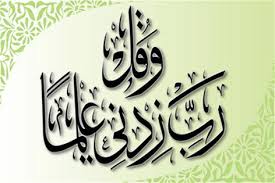Islam has given great importance to the process of seeking knowledge. If we look at the first five verses revealed from the Holy Qur’an, we can see that the word “اقـــــرأ” (read) is repeated two times, the word “قـــــلــــم” (pen) is mentioned once and the word “عــــلَّـم” (teach) is repeated twice.
Let us have a look at the following verses in Surah Al-‘Alaq. “Read in the name of your Lord Who created. He created man from a clot. Read and your Lord is the Most Honorable. Who taught by the pen. Taught man what he knew not.” (Qur’an 96:1-5 )
 Islam makes it a religious duty upon Muslims to seek knowledge. Seeking knowledge with the intention of benefiting oneself and the people is rewarded like performing additional prayers or fasting. The Prophet (PBUH) said: “Seeking Knowledge is an obligation on every Muslim.” (Ahmed)
Islam makes it a religious duty upon Muslims to seek knowledge. Seeking knowledge with the intention of benefiting oneself and the people is rewarded like performing additional prayers or fasting. The Prophet (PBUH) said: “Seeking Knowledge is an obligation on every Muslim.” (Ahmed)
Whoever seeks knowledge and help other people to learn will get unaccountable rewards from Allah (SWT). Allah (SWT) will grant him high ranks in this world and the Hereafter. “Allah will exalt those who believe among you, and those who have been granted knowledge to high ranks.” (Qur’an 58:11)
Knowledge is more important than wealth and property. No wonder, knowledge is among the important things which Allah (SWT) directed Prophet Muhammad (PBUH) to pray that he will be granted more of it. Allah (SWT) says in the Holy Qur’an: “And say: My Lord, increase me in knowledge.” (Qur’an 20:114)
Having knowledge should not be a reason for being arrogant. In fact, having more knowledge about ourselves and the world make us feel more humble before the greatness of the creation of Allah (SWT). “It is only those who have knowledge among His servants that fear Allah.” (Qur’an 35:28)
We ask Allah (SWT) all the time for Paradise. Seeking knowledge is one of the things that will surely lead us to Paradise. The Prophet (PBUH) said: “Whoever follows a path in pursuit of knowledge, Allah makes his way easy to paradise.” (Bukhari)
Teaching others is one of the good deeds that will get us great rewards even after death. Whoever leaves behind beneficial knowledge will get rewards as long as people are still getting benefits from his knowledge. Prophet Muhammad (PBUH) said: “When a man dies all his deeds comes to an end except for three: an ongoing charity, beneficial knowledge and a righteous son who prays for him.” (Bukhari)
It is an irony that while Islam recommends Muslims to seek for knowledge, the Muslim countries are categorized among the developing countries in the world. In many Muslim countries, the percentage of illiteracy is 20 % to 30%. Scientific research and education get a small portion of the yearly budgets in many Muslim Countries.
However, this was not the case during the long history of the Muslim world. Muslim countries were once the most advanced countries on earth. The Islamic civilization was the greatest civilization in the whole world in the Middle Ages and is considered one of the main bases of the modern civilization.
While the medieval centuries are well-known in the Western world as the Dark Ages, they were shining with knowledge and glory in the Muslim world. Public libraries, public hospitals and universities were located in different cities in the Muslim World. Baghdad, Damascus, Cairo and Grenada were the centers of learning in the whole world.
There were many Muslim scientists who had great achievements in different branches of science. For example, Ibn Sina (Avicenna) (980-1037) was a great physician and philosopher. Among his most famous works is The Book of Healing, a vast philosophical and scientific encyclopeadia. His book The Canon of Medicine, was used as a standard medical text at many universities in Europe until the seventeenth century.

Ibn Rushd (Averroes) (1126-1198) stands out as a towering figure in the history of Arab-Islamic thought. He influenced scholarship in both the Islamic world and Europe for centuries, and is best known in the West for his commentaries on Aristotle’s philosophy. Many of his books were used in European universities until the nineteenth century.
Al-Khwārizmī (Algoritmi) (780-850) is a Muslim mathematician and astronomer. He wrote mathematical books that collected and arranged the discoveries of earlier mathematicians. Some words reflect the importance of Al-Khwarizmi’s contributions to mathematics. “Algebra” is derived from al-jabr, one of the two operations he used to solve quadratic equations.
Al-Farabi (Alpharabius) (870–950) is Muslim philosopher and one of the preeminent thinkers of Islam in the Middle Ages. He was regarded as the greatest philosophical authority after Aristotle. As a philosopher and scientist, he acquired great proficiency in various branches of learning and is reported to have been an expert in different languages.
We hope that the Muslim World will be able to restore the glory of the Islamic civilization. The Muslim countries are obliged to achieve more progress and have an advanced place among the countries shaping the modern civilization. Indeed, Muslims should regard achieving progress in different fields of science as a religious obligation and a human responsibility.
